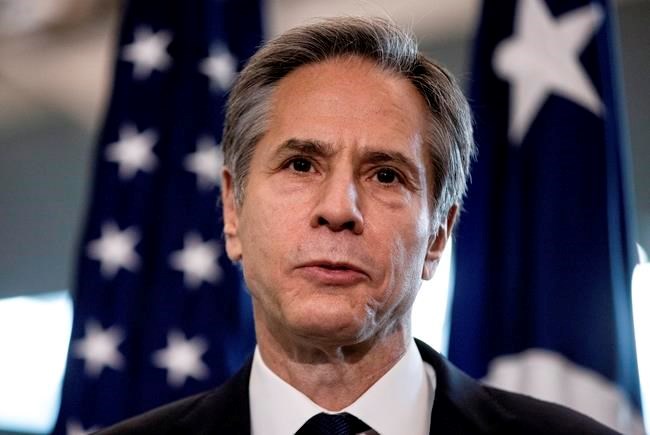WASHINGTON — Antony Blinken will meet virtually Friday with Prime Minister Justin Trudeau and Foreign Affairs Minister Marc Garneau in a day of online diplomacy for the U.S. secretary of state.
Blinken will meet with Trudeau, Garneau and other members of the federal cabinet as part of a "virtual trip" to Canada and Mexico, Blinken's first bilateral video conferences since taking office.
The visit follows up on Trudeau's own virtual summit this week with U.S. President Joe Biden, which produced a "road map" for plans to collaborate on issues like climate change, the economy and COVID-19.
The pandemic made an in-person visit impossible, said Julie Chung, the acting assistant secretary for the Bureau of Western Hemisphere Affairs.
"We decided to do this virtually instead of waiting for the time when it would be safer to travel," Chung said.
"This is the new world we live in through virtual platforms, but we thought it was really important to engage with both Canada and Mexico early on."
Agenda items for the two "neighbours, friends and allies" also include "defending human rights in the Western Hemisphere and around the world, and bolstering our shared defence and security," said State Department spokesperson Ned Price.
That means the conversations will likely include the plight of Michael Spavor and Michael Kovrig, two Canadians who have spent the last two years in custody in China.
Spavor and Kovrig — the "two Michaels," as they are known in Canada — were swept up in the weeks that followed Canada's arrest in December 2018 of Meng Wanzhou, the chief financial officer of Chinese tech giant Huawei and daughter of the company's founder.
Meng is facing extradition to the U.S., where she has been charged with violating sanctions against Iran — a case some observers believe is sure to keep the two Michaels behind bars indefinitely.
On Tuesday, Biden vowed to work with Canada to secure their release, but offered no clues as to what specifically the U.S. is prepared to do.
Justice Department spokesman Marc Raimondi would only say the U.S. will "continue to seek extradition" of Meng, who is under house arrest in Vancouver and due back in court Monday.
Earlier this month, Canada, the U.S. and a coalition of 56 other countries collectively denounced the state-sponsored arbitrary detention of foreign nationals for political purposes.
"We've been consistently for the past year talking about the two Michaels … and calling for Beijing to release these two individuals and stop the arbitrary detention," Chung said.
"Human beings should not be used as pawns. And we stand by Canada, our strong friend and partner, in the issues of arbitrary detention and for the release of the two Canadian citizens."
The followup work after Tuesday's bilateral meetings continued this week in other departments as well.
Environment Minister Jonathan Wilkinson spoke Wednesday with John Kerry, Biden's special envoy on climate, to shore up plans for more stringent emissions-reduction targets in advance of a climate summit in April.
Transportation Secretary Pete Buttigieg and Transport Minister Omar Alghabra committed to more stringent vehicle pollution standards to push both countries toward a zero-emissions future on roadways throughout the continent.
They are also collaborating on new standards for aviation and for seagoing vessels, as well as efforts to develop new clean-tech solutions with an eye toward the goal of net-zero emissions by 2050.
Blinken is also scheduled to meet with a group of Canadian students, as well as with Mexico's foreign secretary and secretary of the economy during a "visit" to a port of entry facility along the southern U.S. border.
This report by The Canadian Press was first published Feb. 25, 2021.
James McCarten, The Canadian Press



